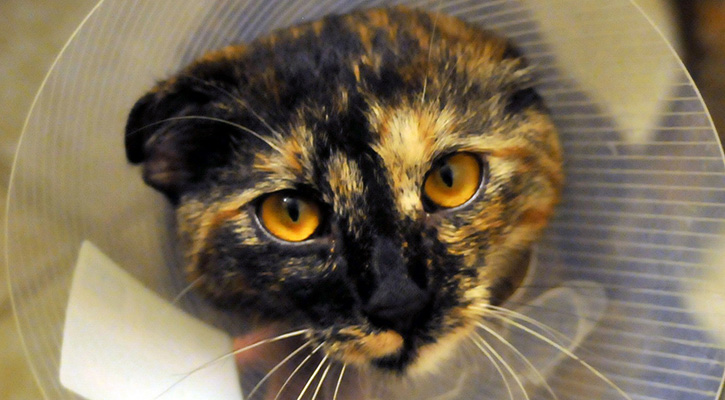Dermatology

While not usually life-threatening, allergies are very uncomfortable for your pet and can lead to secondary skin infections or chronic respiratory issues in some animals if left untreated.
However, most symptoms are associated with dermatologic problems which present as fur loss, excessive licking and chewing or overgrooming, and compulsive scratching.
Because these symptoms can have several possible causes, we recommend making a veterinary appointment immediately for a diagnosis and treatment plan. Early intervention can make all the difference in successfully managing allergies in your pet, and is less expensive than treating recurring secondary infections.
Symptoms and signs of allergies in your pet:
- Biting and chewing at the skin
- Excessive licking of the feet, legs, and abdomen
- Excessive scratching or rubbing at the face
- Frequent ear infections
- Localized hair loss, or change in coat color
- Recurring skin infections
- Chronic anal sac problems
- Hives
Types of Allergies
The first step in developing an allergy treatment plan is to diagnose the allergen that is affecting your pet via a thorough veterinary examination and/or allergy testing. An allergic reaction in your pet is caused by environmental, flea saliva, or – less commonly – food. Your veterinarian can help you determine if one (or more than one!) of the following is the culprit.
Treating allergies in your pet:
It is important to understand that allergies cannot be cured, but they can be successfully managed through various treatment methods which may include:
- Oral medication
- Bathing
- Topical therapy
- Injectable antigen therapy
- Elimination diet if food allergen is suspected. Only about 10% of all dog allergies are food-based.
Prescribing the correct allergy medicine for will depends largely on the symptoms presenting, the severity of the symptoms, and any preexisting medical conditions.
Dermatology
Allergen contributors such as pollen, dust, and mold, food and drugs, and parasites can cause allergic reactions that can severely distress your pet’s skin. Additionally, the hot, humid Florida conditions may exacerbate skin issues for your pet! Our veterinarians always conduct a skin check during your pet’s wellness exams and monitor their dermatologic health throughout their life to ensure any skin issues are caught and treated in the early stages.
Cat Dermatology In St. Petersburg, FL
Schedule an appointment for cat dermatology with your veterinarian as soon as you notice any changes in your cat’s grooming behavior, excessive itchiness, or if you notice red, scaly patches on your cat’s skin. Cat skin conditions can quickly worsen becoming more difficult and costly to treat. Early detection and treatment is key in the fight against cat skin problems. Schedule a cat dermatology exam with a veterinarian from Haines Road Animal Hospital by calling (727) 351-8478.
Explore Our Complete List of Veterinary Services in Saint Petersburg, Florida
- Dog Wellness Exams
- Diagnostics
- Heartworm Prevention
- Preventive Care
- Pet Pregnancy Planning
- Laser Therapy
- Pet Behavior
- Puppy Care
- Cat Wellness Exams
- Pet Nutrition
- Emergency
- Anesthesia & Patient Monitoring
- Kitten Care
- Spay & Neuter
- Vaccinations
- Wellness Exams
- Dental Care
- Surgery
- In-House Laboratory
- Senior Wellness
- Microchipping
